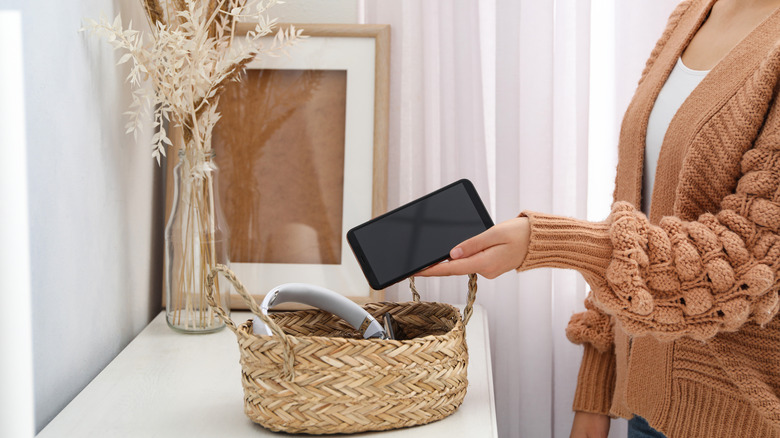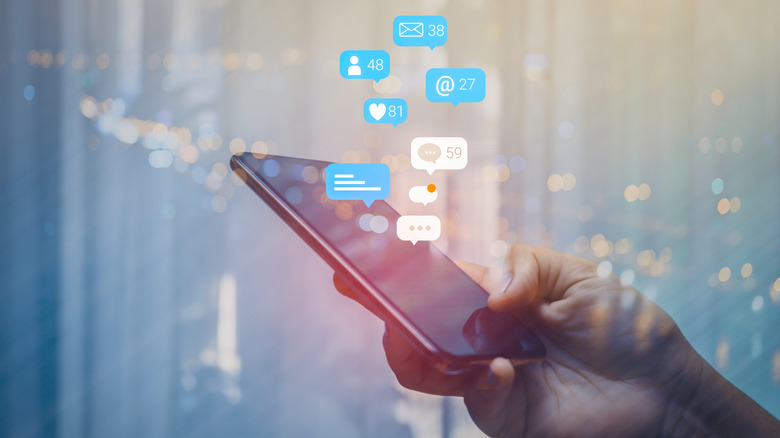Surprising Side Effects Of A Digital Detox
The first iPhone came out in 2007, and since then, most of us have been glued to our smartphones. It contains so much information — contacts, email accounts, social media, text messaging, and every other app you use. It's so easy to get sucked in. You get a notification of a text from a friend who sends you a funny video. That video brings you to Tik Tok, where you start scrolling through other videos. More notifications pull you into other apps, and before you know it, you've spent two hours on your phone. And that doesn't include tablets, laptops, and smartwatches (via SimpleTexting).
Your digital devices aren't just taking your time; they could be increasing your stress, disrupting your sleep, causing anxiety and depression, increased ADHD symptoms, and causing overwork, making it difficult to have a good work-life balance (via a January 2011 study, an October 2017 study, a May 2017 study, and a November 2013 study). Half of teens say they feel they're addicted to their phones, according to a 2016 study.
Are you addicted to your devices? Do you feel like you're always "on," whether it's for work or friends? Are you constantly checking social media to see your likes and shares? Are you checking your work email outside of work hours? It's time for you to set some boundaries and start enjoying your life again, and you can do that with a digital detox.
How to do a digital detox
Begin your detox with a one-day audit. Log everything you do on your phone and other devices and how long you spend doing it. Determine which activities you want to limit or cut out completely.
Choose a digital detox day, like Saturday or Sunday. Turn off all of your devices — even your Wi-Fi. Plan to fill your day with things you enjoy doing or used to enjoy, like reading, writing, drawing, journaling, coloring, walking, hiking, dancing, spending time with your family and friends, doing puzzles, or having a picnic.
If you're worried about missing an emergency message, you can assign a friend to be your backup or invest in another phone. You can use basic cell phones that don't have any other capabilities than making and receiving phone calls. You can set up a basic cell phone and number for emergency calls, or even go old school and get a home phone. If there's an emergency, your friends or family can call that number to get in touch with you.
You might feel bored at first, but remember all the activities you can enjoy offline, especially when you get to enjoy them alone or with your loved ones. You'll look back wondering why you wasted so much of your time on a device (via Healthline, Forbes, and Health).
How to limit your phone use
Social media sites like Facebook, Instagram, Twitter, and Tik Tok can suck up a lot of your time if you let them. Set a timer and limit your social media time to 15 minutes a day, or only check your accounts once a week for an hour.
Do you check your phone every time you hear a ping? Turn off all your notifications.
Make certain rooms in your home device-free — your bathroom, bedroom, and kitchen. You can use devices in your living room or office only. Invest in an alarm clock for the bedroom instead of using your phone's alarm.
Avoid using your phone when interacting with other people — family, friends, clerks, servers — anyone. Set your phone down and give them your full attention.
Set phone curfews, especially if you tend to endlessly scroll at night and put the phone away at least two hours before you need to go to sleep. You can also block out times you will check your phone and keep it stored the rest of the time. Store it in a designated drawer in your living room or office, not your pocket.
You'll enjoy less stress, depression, and anxiety, less severe ADHD symptoms, better sleep, and a better work-life balance. (via Healthline, Forbes, and Health).



